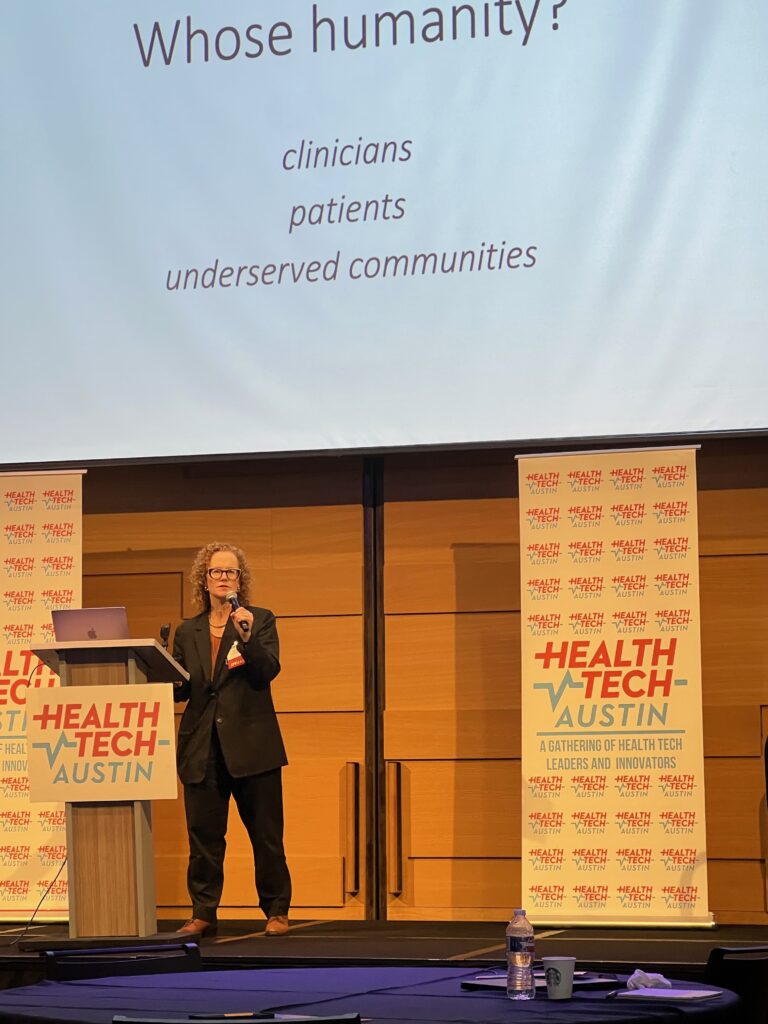
Kirsten Ostherr, professor and founder of Medical Future Labs at Rice University
Health Tech Austin hosted Tuesday’s Future of Health Summit at the downtown Austin Public Library. These are some key takeaways from some of the speakers.
- Using Tech for Better Health Outcomes: A National Science Foundation-funded Engineering Research Center called PATHS-UP at Texas A&M University studies biomarkers to detect cardiovascular disease and diabetes. It’s part of a 10-year, $40 million grant from NSF involving scientists, clinicians, and industry. Chris Finberg, Innovation Director at PATHS-UP, is spearheading the effort. They are studying inserting a rice-grain-sized monitor under patients’ skin to monitor glucose and macronutrients continuously. The researchers are holding a digital health workshop, 2024 PATHS-UP, on August 27 and 28th at Rice University.
- The Humanity Behind the Technology: Kirsten Ostherr, professor and founder of Medical Future Labs at Rice University, focuses on the humanity behind technological advances in healthcare, focusing on patients, clinicians, and underserved communities. “Because technology alone cannot solve our most pressing social, cultural, and ethical problems in health,” according to Ostherr. For example, people need to start focusing on the root causes of disease and prevention. Every year, $1.1 trillion is spent in the U.S. on healthcare for diet-related diseases, Ostherr said. More focus should be on food as medicine. Ostherr also warned of the risks of unregulated AI in healthcare, including inflated bills, denied claims, inaccurate records, inappropriate care, biases that could exacerbate health disparities, and other concerns.
- Show Me the Money: Claire England, investment partner in Austin with GPG Ventures, said a lot of venture capital is available in Texas looking for good deals to invest in. According to its website, the firm typically invests between $100,000 and $1 million in early-stage ventures. Its portfolio of investments includes several medical devices, diagnostic, therapeutic, consumer health, and health IT startups.
- The U.S. Healthcare System is a Mess: Charles Silver, professor and endowed chair at UT School of Law at Austin, co-authored a 2018 book, “Overcharged: Why Americans Pay Too Much for Health Care,” and spoke about why Americans are paying more. The U.S. spends twice as much per capita on healthcare compared to other developed countries, according to Silver. He said that Medicare is insolvent and contributes significantly to the U.S. deficit, including $446 Billion in 2023. He noted that healthcare providers’ lack of pricing transparency contributes to the problem. He pointed to the Surgery Center of Oklahoma, which provides transparent pricing for all procedures on its website, and said all hospitals should provide upfront transparent pricing.
- SXSW kicks off next week and has tons of healthcare programming: Hugh Forrest, Co-President and Chief Programming Officer of SXSW, gave an overview of the Health & MedTech Track at SXSW 2024, sponsored by Johnson & Johnson. The full schedule can be found here.
